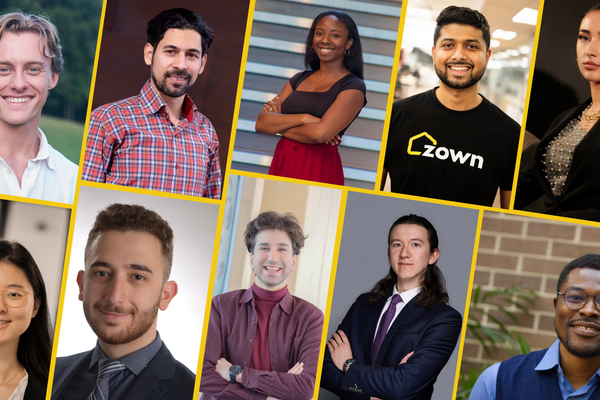
As the world gathered at COP to talk, young entrepreneurs act
The contributions of young environmental leaders go well beyond activism and into the realm of economic transformation

The contributions of young environmental leaders go well beyond activism and into the realm of economic transformation
By Media RelationsWhen we think of the many contributions that young Canadians make to environmental issues, our minds naturally turn to youth activism – to the energy, the anger and the vision that young people articulate and was in sharp focus during COP28, this year’s annual United Nations climate conference. But I have seen a different side of youth leadership in the environmental space, one based on entrepreneurship and innovation which is often overlooked by our global community.
My work gives me the opportunity to work alongside some of Canada’s most gifted youth as they turn their knowledge into new ventures and business start-ups. I have met with students who are supporting reforestation projects through satellite heat imagery, launching safe and ecologically-sound feminine hygiene products in East Africa and engineering bacteria that eats plastic waste and excretes water. The contributions of young environmental leaders go well beyond activism and into the realm of economic transformation.
These new ventures are important to local economies, creating new jobs and help to anchor their local communities. This kind of entrepreneurship is also critical to achieving global environmental goals. The UN and the international community can set out big objectives like the Sustainable Development Goals (SDGs), which direct us to achieve things like clean water and sanitation or affordable and clean energy, but what does clean water or clean energy mean? Sometimes, it means creating new technologies or processes that students will discover through their studies, but developing the entrepreneurial vision and skills to deliver these innovations to the wider world are just as important.
Two years ago, the Montreal-based Commission for Environmental Cooperation (CEC), a body linking Canada, the U.S. and Mexico on environmental initiatives, provided the University of Waterloo with funding to develop a tri-national EcoInnovation Network. Its goal is to share best practices around youth entrepreneurship and green innovation between universities across the three countries, and to empower an emerging generation of young leaders to rethink our economy. Through this initiative, the University of Waterloo has led a growing international coalition of universities, including Laval and Simon Fraser in Canada, Columbia and Rutgers in the U.S., and Anahuac and Tecnologico de Monterrey in Mexico.
Through in-person workshops, online seminars, pitch competitions and start-up incubators, this emerging EcoInnovation Network has begun to develop a sense of how to support youth innovation. This year, COP28 served as a venue to share these experiences with the wider world, challenging our collective perceptions of youth environmentalism and inspire other academic institutions to embrace their role in nurturing innovation and green entrepreneurship.
Communicating ideas at big international meetings like COP is often done through policy documents that provide easy-to-use guidance on critical issues. In this case, we gathered together a group of more than 60 academics, entrepreneurs and youth leaders from across North America to craft a paper titled Fostering Youth-Led Innovations to Accelerate Progress, and launched it at COP28.
The paper highlighted three actionable recommendations we know have the potential to drive up youth innovation in terms of scale, reach, and impact. First, renew focus on enhancing education and awareness about sustainability. Next, establish and open existing innovation hubs, incubators, and accelerators to young people and, finally, promote mentorship initiatives.
I can not emphasize this last recommendation enough as mentorship facilitates upskilling as well as the transfer of knowledge and collaboration across generations. While the resources to support youth leadership may exist, the fear of failure often impedes them from action. Mentorship programs should be inclusive and diverse in the subject matter experts they recruit to ensure that they are able to advise youth of all backgrounds and foster leadership mindsets.
Of course, white papers aren’t the most exciting thing in the world, but somehow, amid all the noise at COP, this one began to generate some momentum. Former UN Secretary-General Ban Ki-moon penned an introduction. Translation into multiple languages is underway. Teams are working on taking the paper’s key ideas and using them to launch A.I.-based toolkits to better support youth entrepreneurship.
It may not be enough to restore our faith in the COP process, but perhaps it points to signs that something else is underway, an undercurrent in the global climate and environment discussion. While the world gathered in Dubai to talk, a growing cohort of young entrepreneurs is moving to act, and launching a new generation of ventures that will lead to a greener, cleaner future.
Brock Dickinson is Director of the Economic Development Program and has worked in local economic development for 25 years. He is currently the Entrepreneur-in-Residence and an Adjunct Professor in the Faculty of Environment at the University of Waterloo.
This past November, Dickinson attended COP28 in Dubai and noticed something important that’s underway and far too overlooked – youth entrepreneurship and its ability to deliver a green, clean future and support our economic development.

Read more
Redefining capstone learning by bringing students, faculty and community partners together to tackle real-world challenges

Read more
Here are the people and events behind some of this year’s most compelling Waterloo stories

Read more
From transforming solutions for homeownership to advancing health care interventions, Waterloo talent continues to disrupt industries and drive change
The University of Waterloo acknowledges that much of our work takes place on the traditional territory of the Neutral, Anishinaabeg, and Haudenosaunee peoples. Our main campus is situated on the Haldimand Tract, the land granted to the Six Nations that includes six miles on each side of the Grand River. Our active work toward reconciliation takes place across our campuses through research, learning, teaching, and community building, and is co-ordinated within the Office of Indigenous Relations.